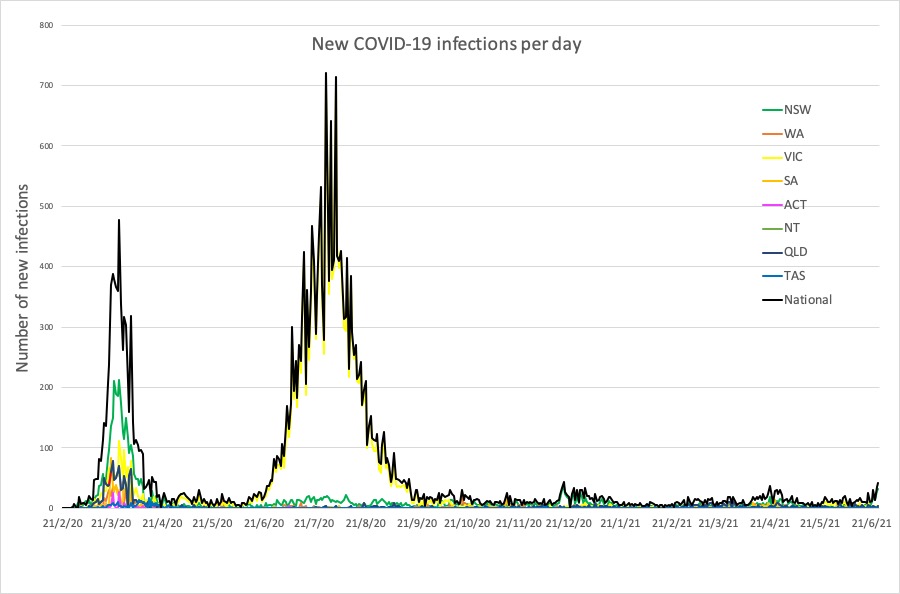And Johnson & Johnson covid vaccine gets provisional approval in Australia.
Welcome to The Medical Republic’s COVID Catch-Up.
It’s the day’s covid-19 news in one convenient post. Email bianca@biancanogrady.com with any tips, comments or feedback.
28 June
- Lockdowns break out around the country.
- Johnson & Johnson vaccine gets provisional approval in Australia.
- TGA investigates cases of Guillain-Barre Syndrome following AstraZeneca vaccination.
- Pfizer and AstraZeneca vaccines offer high level of protection against Delta variant.
- The latest covid-19 infection numbers from around Australia.
Greater Sydney and Greater Darwin are in lockdown, masks are mandatory in indoor public venues in the ACT, Queensland, West Australia and South Australia, and numerous states are imposing restrictions on hospitality, sporting and public gatherings, as covid-19 breaks loose around the country.

The Johnson & Johnson covid-19 vaccine has been granted provisional approval for use in Australia although it is not currently included Australia’s covid vaccination program.
The vaccine is similar to the AstraZeneca in using adenoviral vector to deliver a piece of the SARS-CoV-2 spike protein. It has also experienced some of the same issues with rare cases of thrombosis with thrombocytopenia, most commonly manifesting as cerebral venous sinus thrombosis.
The TGA is keeping a close eye on a possible association between the AstraZeneca vaccine and Guillain-Barre Syndrome.
So far, there have been 38 reports of suspected Guillain-Barre Syndrome – a rare immune disorder in which nerve inflammation causes pain, numbness, muscle weakness and difficulty walking – following a dose of the AstraZeneca vaccine.
However the agency stressed that so far no causal link with the vaccine has been established.
Two doses of either the Pfizer or AstraZeneca vaccines appear to still offer a high degree of protection against hospitalisation with the Delta variant of covid-19, according to unpublished data from Public Health England.
Analysis of data from 14,106 cases of infection with the Delta variant – 166 of whom were hospitalised – found two doses of the Pfizer vaccine reduced the rate of hospitalisation by 96% and the AstraZeneca vaccine reduced it by 92%.
The loss of smell associated with covid infection could persist for a year in a small number of patients, according to a paper published in JAMA Network Open.
A study of 97 people with confirmed covid who experienced acute anosmia that persisted for at least seven days found nearly 53% of them still experienced some loss of smell at four months and one patient still had full loss.
At eight months and one year, two patients still reported some or all loss of smell but the remaining 95 had regained their olfactory abilities.
Here are today’s covid-19 infection numbers from around Australia to 9pm Sunday:
National – 30,499 with 910 deaths
ACT – 124 (0)
NSW – 5756 (32)
NT – 181 (3)
QLD – 1683 (3)
SA – 794 (3)
TAS – 234 (0)
VIC – 20,706 (1)
WA – 1021 (0)



